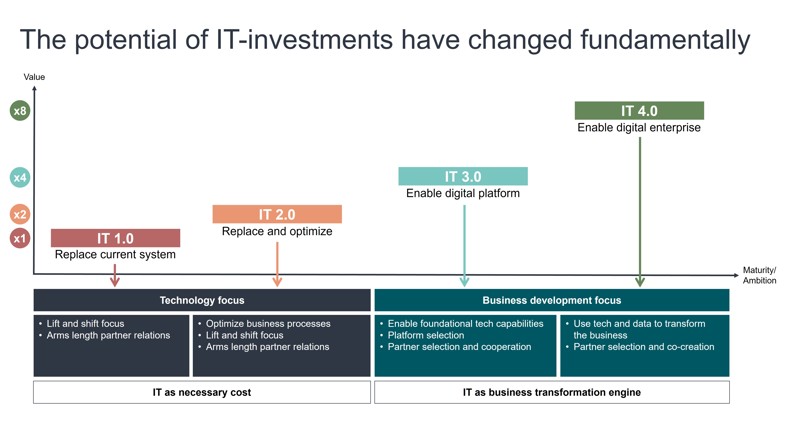Artificial Intelligence, cloud, IoT, big data, intelligent applications, mixed reality, digital twins, robotics, tech. democratization … the list go on. We live in a time of fast-paced technological innovation, but is everyone keeping up?
The businesses that are keeping pace with these innovations have made a fundamental shift in the way they view technology investments.
As part of our daily work at Cepheo, we engage with many different businesses who all have their own unique ‘current state’ when it comes to their technology landscape and their approach to technology investments.
In our experience, businesses can be grouped into four different types, based on their current state. We call these types IT 1.0, IT 2.0, IT 3.0 and IT 4.0. Let me explain each of these.
What are IT 1.0 to IT 4.0?
Some businesses need to “upgrade” their existing business applications as they are now drastically out of date and under-supported. This is often called a ‘burning platform’. In this case, the process of upgrading is typically IT-driven with the involvement of end-users to make sure that they are comfortable with the new applications. We call this type of technology investment state ‘IT 1.0’. It is basically a traditional ‘lift-and-shift’ technology transition that is driven by necessity.
Other businesses supplement the lift-and-shift process above with at least an outline of the operational optimization and business value they would like to see this investment facilitate. We call this technology investment state ‘IT 2.0’.
From an IT 1.0 and IT 2.0 perspective, IT projects are basically seen as discrete activities with a start date and an end date. An upgrade, and hence IT, is seen as a necessary cost and not an investment.
Businesses with an ‘IT 3.0’ ambition are actively looking to enable or accelerate business development by enable a digital platform. One example of an IT 3.0 project I drove jointly with a company focused on enabling a business model for a new business area and preparing the technology foundation and business capabilities for digital transformation. Due to the strategic importance for the company, the CEO took charge of the process.
‘IT 4.0’ businesses are characterized by an ambition to embrace long-term, digital transformation. They might need to start by moving business applications to the cloud, but they have a multi-year perspective and an aspiration to use technology to differentiate themselves in the market.
IT 3.0 and IT 4.0 businesses no longer see IT investments as projects with a start and an end date. Instead they see technology investments as an ongoing journey to bring them into a digital future. Technology investments become strategic investments and the C-suite leads the way.

The four different stages of technology investment
Implications of IT 4.0
Businesses who have IT 4.0 ambitions typically need a partner to guide them on their journey, especially if they have chosen a best-of-suite approach and have selected a specific platform they want to use. A partner that has strong business acumen and can guide them on how they best can exploit the complex tech stack on the journey. They enter a long term co-creation partnership with this partner to realize a long-term goal, such as market leadership.
One of the companies we work with wanted to embrace digital transformation based on the Microsoft technology stack. Jointly, we shaped a winning aspiration for their business, outlined digital design principles, created digital playbooks, etc.
Finally, we made the business case and outlined a five-year digital transformation roadmap. Now, we are on an exciting journey together with the company to help them achieve their goal of becoming market leader in their industry.
Where is your business?
Many businesses will recognize that in terms of maturity, they fit the description of IT 1.0 or IT 2.0, but that their ambitions point towards IT 3.0 and IT 4.0.
An important step in terms of digital transformation is identifying where you and your company are in terms of technological and organizational maturity, what your ambitions are, and what it will take to get there. And as a trusted partner, Cepheo is ready to discuss how we can empower your digital and business aspirations, regardless of where you are on this journey.
-

Rune Refvik
Industry Executive
With broad experience from both industry and the public sector, Rune has throughout his career developed and delivered IT-driven services that create measurable business value. He has held leadership and specialist roles ranging from top executive and Enterprise Architect to COO, and has led organizations through complex transformations and technology implementations. At Cepheo, Rune applies his deep knowledge of Microsoft Dynamics 365, the full Microsoft platform, AI and modern methodologies, as well as experience from industries such as construction and real estate, manufacturing, fisheries and e-commerce, to accelerate growth and realize value for customers.
Contact our Sales Directors for a discussion about your company's digitization.
-

John T. Hummelgaard
Sales Director, Denmark
-

Caroline Berg
Sales Director, Business Development, Sweden
-

Lars Erik Lindhjem
Sales Director, Norway






